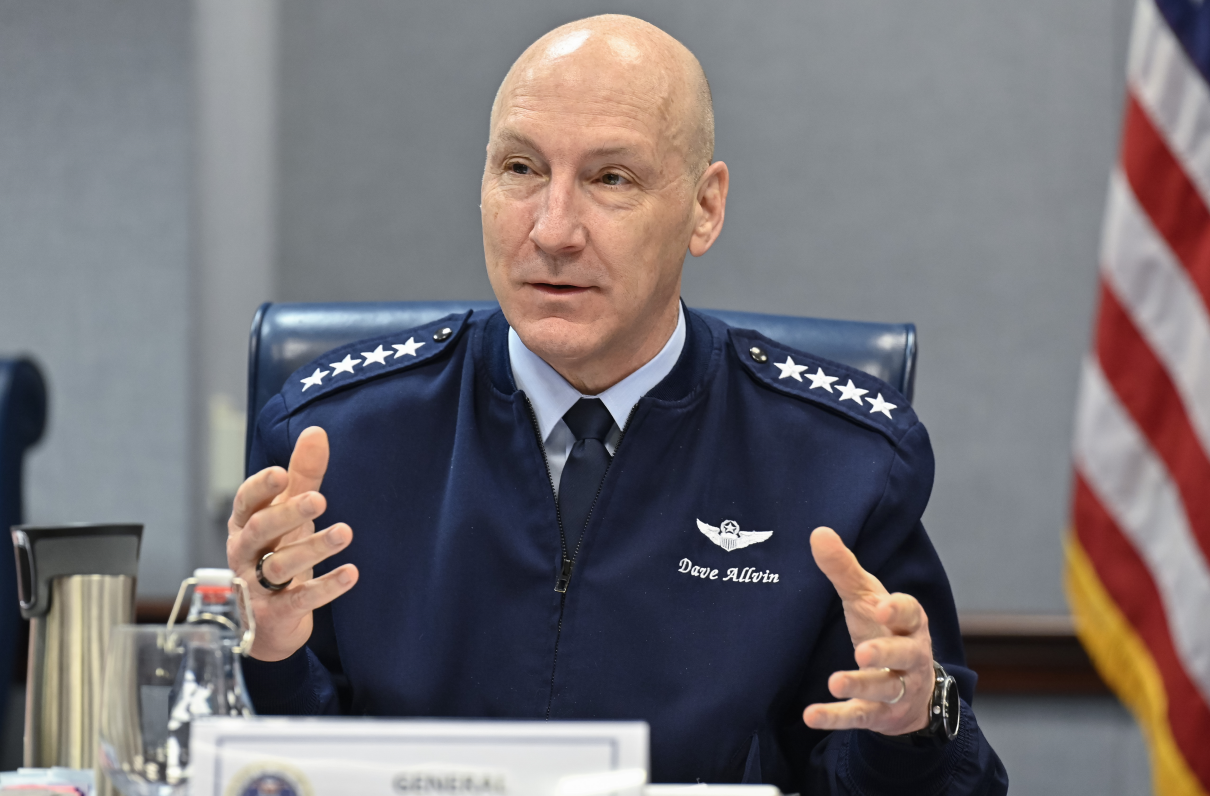Editor’s note: This article by Thomas Novelly originally appeared on Military.com, a leading source of news for the military and veteran community.
Air Force Chief of Staff Gen. David Allvin told airmen in a newly released memo that officials are focusing on updating family and mental health resources for airmen as they continue to highlight the urgent preparation needed for a potential future conflict in the Pacific.
The memo, provided first to Military.com and shared publicly Tuesday, was titled "Refocusing Family Readiness." Amid the Air Force's latest shift to reorganize the force for great power competition -- the service's term for increased spending and strategy against adversaries such as Russia and, most notably, China -- it offered an inward look at how it plans to support airmen and families during the sweeping changes.
"While our efforts to prepare the force for future challenges are essential, they will be incomplete without a parallel focus on family readiness," Allvin wrote. "In order to meet the moment in this time of consequence, we need to ensure that families and communities connected to the Air Force are as well prepared as our service members for the possible challenges that lay ahead."
[RELATED: More Spouse and Family News From MOAA]
A number of programs have been rolled out and revamped in recent months, and Allvin hinted that others are currently underway including combining the Air Force’s True North programs and Operational Support Team programs to best support airmen and their families.
Allvin pointed to the Sept. 11, 2001, terrorist attacks, when he was serving as a squadron commander at Grand Forks Air Force Base, North Dakota, as an example for "how collectively unprepared" service members and their families were for that change.
"We cannot afford to be in that situation again," Allvin wrote. "The insights I gained then have been validated in the years since, and serve as motivation for what we in the Air Force community need to strive to achieve when it comes to family readiness."
Sweeping changes to the force came earlier this year. In February, Allvin and other Department of the Air Force leaders rolled out numerous changes ranging from bringing back warrant officers, reorganizing training organizations and creating new offices. The changes all underscore the need to prepare for a looming conflict: potential control and invasion of Taiwan by the Chinese Communist Party.
The memo is one of the first indications of some family- and mental health-related changes the force is making in that reorganization effort.
Katherine Kuzminski, a senior fellow at the Center for a New American Security think tank who studies military personnel and family policy, told Military.com on Tuesday that the memo's comparison to how service members and their families were caught off guard by terrorist attacks in 2001 is notable.
"I think it's an apt comparison, just in the fact that in the lead-up to 9/11 the military was much more domestic, and they weren't deploying in the large numbers that we saw, and it really did matter that perhaps the support structures weren't in place," Kuzminski said. "The family readiness groups handle everything from training and advising families on how to just go through all the paperwork that comes along with the deployment, to coming up with a family care plan and family action plan."
One change has been rebranding the Key Spouse Program to the Commander's Key Support Program. That program helps connect families, spouses and single airmen to resources.
[RELATED: Commander's Key Support Program]
Volunteering opportunities have been expanded to more than just wives and husbands and now include participation for airmen, Guardians, federal employees and family members, regardless of marital status, the service announced earlier this year.
Kuzminski said that's necessary because many military spouses are working now and don't have the time or resources to devote fully to those programs.
"I think it's significant that they are changing the name from the Key Spouse Program," Kuzminski said. "Because that is another area where, in the last 23 years since 9/11, it's become evident that society has really changed, and the family readiness groups across all services have long depended on the fact that the service member who was married, that their spouse did not work."
Allvin says the service has also reshaped the Relocation Assistance Program, which provides resources and information to families making a permanent change of station move.
In a related change, airmen and Guardians with dependents who go to a professional military education or training location can now collect per diem at a Basic Allowance for Housing rate while also still receiving a housing allowance at their prior duty station for their families.
[TAKE ACTION: Ask Congress to Restore the Basic Allowance for Housing]
The Air Force is also reorganizing how it provides some mental health resources to units. Allvin explained that the service is in the process of merging the existing True North mental health programs and Operational Support Team programs to create a new resource called "True North +" that will allow officials to deploy chaplains and counselors to affected units quickly.
The service has also updated its Resilience website to connect service members and families with resources, "including crisis management tools (e.g. suicide hotline number, Military OneSource, Sexual Assault Prevention and Response, civilian Employee Assistance Program, etc.), and guidance," he wrote.
Allvin ended the memo calling for everyone, not just family members, to be prepared for potential crises and to know where they can best find resources.
"Our service needs everyone in the Air Force community, including service members, civilian employees, family members, and community partners, to work together to improve our resilience and prepare to respond in moments of crisis," he wrote. "To achieve this, I encourage everyone to contribute to family readiness by getting involved, innovating, and preparing themselves for critical moments."
Support Military Spouses
Donate to The MOAA Foundation and support MOAA’s efforts to help military spouses in their career journeys.
